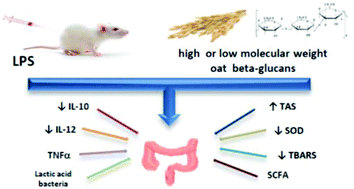The effect of low or high molecular weight oat beta-glucans on the inflammatory and oxidative stress status in the colon of rats with LPS-induced enteritis
Abstract
Purpose: The aim of the study was to investigate the protective effect of low and high molecular weight beta-glucans on the chosen immunological parameters, markers of antioxidative potential in rats’ colon tissue, the number of lactic acid bacteria (LAB) and the concentration of short-chain fatty acids (SCFA) in rats’ faeces. Methods: The experiment was carried out on 72 8-week old male Sprague–Dawley rats: control (n = 36) and experimental (n = 36). In half of the animals from each group enteritis was induced by LPS (10 mg kg−1). Rats from the experimental group were divided into two groups receiving high (GI) or low (GII) molecular weight beta-glucans for 6 consecutive weeks. Results: LPS evoked enteritis in all the treated animals, manifested by changes in the levels of IL-10, IL-12 and TNF-alpha, as well as in the number of intraepithelial lymphocytes (IELs) and lamina propria lymphocytes (LPLs) in the colon tissue. Dietary supplementation with beta-glucans following LPS treatment partially reversed this effect. The changes in SCFA concentration were noted, indicating an improvement of the fermentation process in the colon. This effect coincided with an increased number of LAB, pointing at the prebiotic properties of beta-glucans. The positive influence of beta-glucans was also manifested by the improved values of antioxidative potential markers (TAS, SOD, GR and GPx activity, TBARS concentration), noted especially in rats with LPS-induced enteritis. This influence was more pronounced in the case of low molecular weight oat beta-glucan (GII). Conclusions: The present study showed a positive effect of beta-glucans, especially the low molecular weight form, on the colon tissue of healthy rats, as well as animals with LPS-induced enteritis.


 Please wait while we load your content...
Please wait while we load your content...